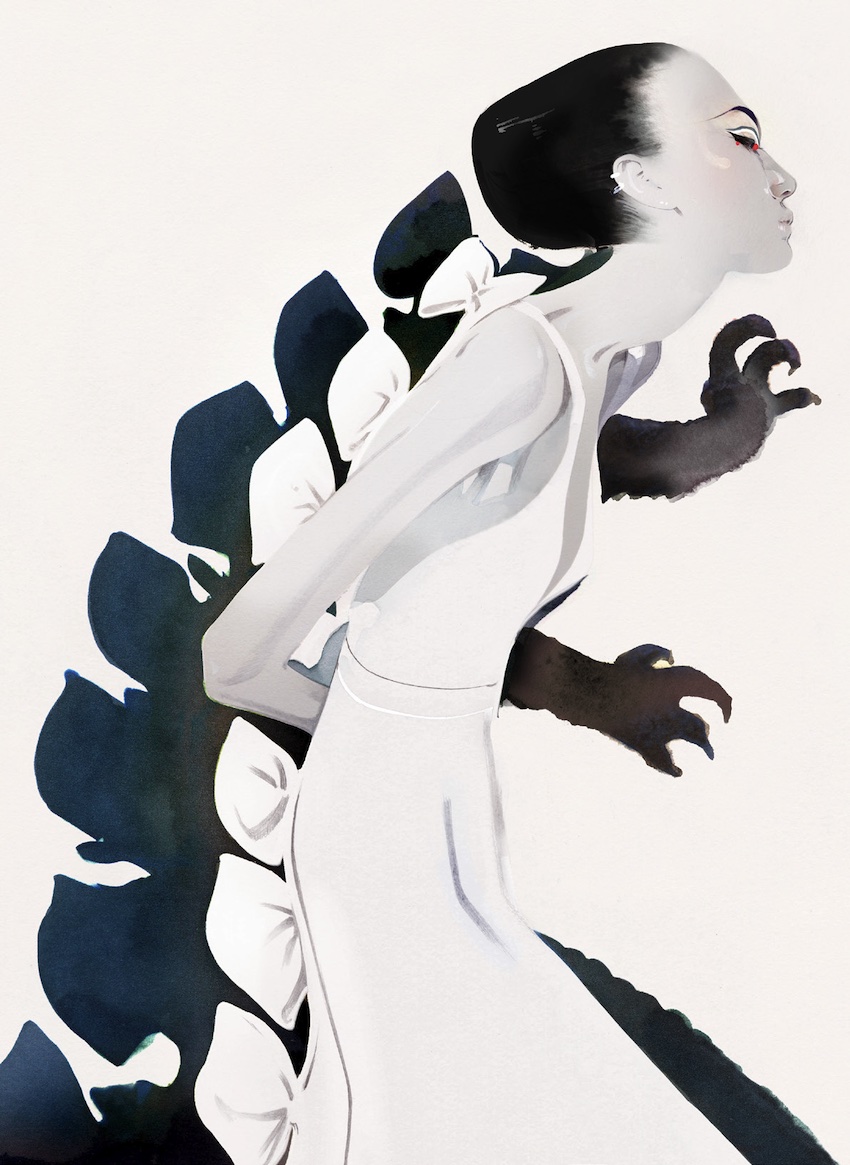The Bridal Affair
Only the devil incarnated: when a dream bride turns into the biggest nightmare for those around her, it's hell on earth. But why do some women change so much when it comes to their wedding day? How to deal with this? And how can it be avoided?
On the day they say “yes” to the marriage proposal, some brides may also be saying “no” to some relationships that will not survive the arduous path to marriage. The pressure, the expectation, the overwhelming attention are potential triggers for the release of an unexpected monster, a situation so recurrent that it even has its own term: “bridezilla”, that purgatory of lack of control in which the bride finds herself with Godzilla. “Bridezilla is not a recognized term in psychology, nor is it seen as a pathology”, says Joana Canha, clinical psychologist. “However, it is often used to describe a state in which the bride finds herself, generally, where she feels enormous internal and/or external pressure, generating states of stress and anxiety, leading to difficulty in emotional management and moments of emotional loss of control. This state is so intense that it leads these women to make absurd demands on friends and family, often disregarding their feelings.” It's because of episodes like this that the Internet is full of bridesmaids stripped of their positions, besties saying bye-bye to each other and family members disinherited because of that ring that transforms the fairy tale into Mordor. Some stories in which “my precious” supplants “you're precious” involve the demand for certain favors that go beyond the limits of logic and despise and disregard the feelings and comfort of the guests closest to the bride - those who are front row and, therefore, are also the first to get the cake in their face when the star explodes. One was furious when her sister got an innocent tattoo and accused her of ruining the wedding photos; others (plural) wanted their bridesmaids to be available at their beck-and-call; one in particular thought her bridesmaid was too fat and wanted her to lose weight; and, still from the look's perspective, there are even brides who demand radical changes in their maid of honor’s appearance - unwanted haircuts, pierced ears and other requests like that, etc., in an endless list of demonic engagements that populate sites like buzzfeed and reddit. Two particularly shocking ones include a bride who thought it was disrespectful that one of her bridesmaids had gotten pregnant and another who wouldn't let the groom accompany his father, who had just had a heart attack in the middle of the ceremony, to the hospital. Stories about expensive demands with no regard for friends' budgets also emerge in abundance across cyberspace. Does it seem inconceivable? Maybe not as much as one might think.
“A wedding, for the vast majority, is the most special event in a person’s life”, the psychologist begins by explaining, to introduce the variables that can create the perfect cocktail to bring out Mrs Hyde, that macabre alter-ego, Dr. Jekyll's monster. “Planning a wedding involves great organizational skills, but also great resilience to frustration and pressure. There is the search for perfection, down to the smallest detail, the demand for managing the opinions of family and close friends, the fear of something failing and the search to make that day a memorable event for everyone. Everything is thought out in detail, with a huge investment of money, time and dedication. This takes place over several months, under constant pressure that nothing goes wrong and the logistics of everything a wedding involves to converge on a perfect dance that day. This expectation (unrealistic and idealized) often has no room for the unforeseen, the uncontrollable. Brides are under enormous stress and are usually overcome by an overwhelming feeling, leaving them feeling anxious, alone and tense for long periods of time. This exposure to stress and anxiety can (in more extreme states) lead to emotional instability. However, not all of them become bridezillas. Those who fit this hat are women who completely disregard the feelings of family and friends, treating them inappropriately and offensively.” The psychologist points out that, in her field, it is not considered a pathology, which doesn’t mean that it doesn’t affect mental health, of course, due to all of the above. It is obvious that, despite the multiple episodes validating the existence of the bridezilla character, not all brides get there, but when the variables come together, the ideal context for the terror alter-ego to emerge is formed. The ego can also be one of these variables, explains Canha: “even though it may not come from an ego issue, it is involved. There are many different stories where the bride makes absurd requests or demands, with total disregard for the other person. Often, the feeling of entitlement takes on great proportions and the bride becomes something more akin to a dictator. Here the need for extreme control is visible, and, often, to always be in the center of attention throughout the process and not just on the day”, adding that “marriage is about the union of two people, however the attention falls on more on the bride. More insecure brides, but with a more aggressive stance on their vulnerabilities, may exaggerate so as not to show (and sometimes not even feel) that insecurity.” But Godzilla doesn't just come from within. Sometimes, it is the exterior that teases the villain: “not all bridezillas are real bridezillas”, warns the clinical psychologist. “In other words, many women end up engaging in inappropriate behavior towards other people as a result of several variables, such as the pressure of unrealistic expectations from others (what the ceremony should be like, the reception, the dress...), the constant attempt to make the day correspond to what the bride has idealized in her head, the management of the large financial investment, more discussions between the couple and even the weather of the day”. Joana Canha confirms that social and family pressure can greatly exacerbate this behavior: “On different occasions in life, other people always have something to say and marriage is not only no exception but is fertile ground for this. Suggestions (or even impositions), opinions and criticism of various aspects and the expectations of others have a great influence on the way the bride feels throughout the process. They are a huge element of stress and anxiety and are often opinions based on the ideas of others rather than the couple’s wishes.”
The opposite is also true: in the same way that they can increase stress, the members of the bridal party can also help to alleviate the escalation of “violence”, they can be a deterrent to the bride's dark side. “The people closest to her can help by being attentive to the bride's emotional state, occasionally asking how she feels and if she needs help, helping her have fun and even stopping thinking about planning (providing moments of fun)”, suggests Joana Canha. “Always remembering that it is her day and that, naturally, it is a day for the couple to feel special, contributions must be made with affection and tact”. We must not forget that “the woman/bride is exposed to greater pressure”, continues the clinical psychologist. “It is a term that (many) believe is linked to a more traditional and conservative expectation of the role of women, of what is expected of them, of the way they dress and behave. Historically, the role of organizing marriage has almost always fallen to the woman, demanding more from her than from the man. However”, she points out, “there are also men who want to take the reins of organizing the wedding for themselves, and can become groomzillas. It's not so common, but it's possible”, points out Canha. This social attention linked to the organization of the relationship must weigh on the way in which one interacts with the protagonist. If you are someone used to being brutally honest with your bride, remember that her nerves in this process are more raw than usual, which may require more patience from you. If necessary, vent to other people close to you, to keep a cool head when dealing with the potential bridezilla. Help ease the pressure by arranging something fun, be available to listen, and remain empathetic. But set limits, because constantly giving in to every whim will also validate its continuation. If everything becomes too much, it's also worth giving space to preserve the mental health - and relationship - of both parties. And if the lack of control becomes unbearable, it's not worth becoming a target, walk away. Even though there is extra understanding due to the demands of the event, this understanding cannot be unilateral.
If you're reading this article and you're the bride in question, and you're worried about checking all these bridezilla points, take a deep breath and try not to feel overwhelmed, so you can free yourself from unnecessary pressure. “Currently, more and more couples turn to wedding planners with the aim of removing or drastically reducing the stress and pressure associated with organizing the event. But this involves another financial expense”, says the psychologist. “Organizing a wedding has its share of tension and worry, but there are some steps that the bride can take to avoid reaching such a point of loss of control (and often suffering). It is possible to plan a wedding and enjoy organizing it. You need to be willing to accept that, despite your best efforts, something will not go as planned and that is ok. The important thing is the purpose of marriage, which is to marry the person you want to be with. Having the ability to relativize some things, think about what is really important; delegate and ask for help; don't forget to take breaks from planning, relax; involve your partner and not do everything alone.” After all, if life is meant to be for two, let it start now: to be by each other's side for richer and for poorer, in sickness and in health, in marriage and in its planning.
Translated from the original in The Blossom Issue, from march 2024. Full credits and stories in the print issue.
Most popular
.jpg)


Relacionados
.jpg)
Anna Wintour e o presidente da câmara de Milão, Giuseppe Sala, revelam a localização do Vogue World 2026
24 Feb 2026



O que lhe reservam os astros para a semana de 24 de fevereiro a 2 de março
24 Feb 2026



